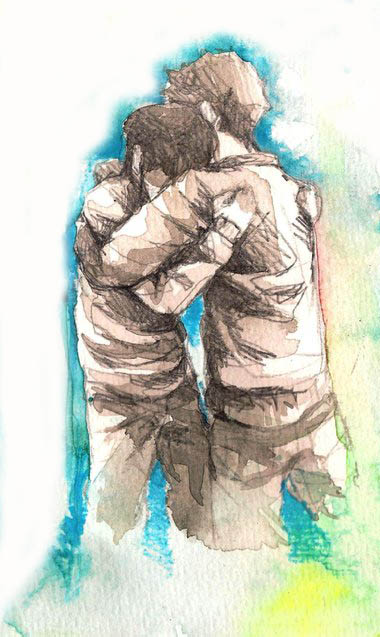February 24, 2015 // Local
A penitent’s reflection on Reconciliation
Pride keeps me from asking for help. Fear tells me I might lose what I have and so I scoff at letting anything go. I struggle to be genuinely happy for others who have more than me; and appropriately concerned for those who go without. Disconnected and callous, I must justify myself. I fill my life with avarice, spiritual sloth and self-centeredness. Yet, ironically, all this bounty leaves me feeling incredibly empty.
Through pursuing the illusion of control and flaunting my freedom to choose for myself, I have shackled my own spirit. I long for a peaceful day, a quiet mind and a lighter step; but I neither want to be disciplined nor controlled. It will take a humble heart for me to accept this spiritual truth: God is not about control, He is about liberation and He gives us the sacrament of Reconciliation to set us free.
Life experience has taught me that humility is a great asset; one that was vital in my recognizing the infinite value of the sacrament of Reconciliation in my life. The most applicable definition I have found: Humility amounts to a clear recognition of who and what I really am, followed by a sincere attempt to become what God would have me be.
If God has any anger associated with my sins, it is because they have kept me from becoming all that He created me to be. The love, comfort and peace I sought eluded me until I accepted that I would only experience happiness by aligning my will with His. I found it humbling to be open to guidance, both intellectual and spiritual. This elusive concept eventually evolved into a simple (but not always easy) series of daily choices.
Our examination of conscience before receiving Reconciliation matures as our understanding of Catholic teaching and Scripture increases. For me, it has evolved from a quick checklist in the pew to a nightly inventory of the preceding day. Where was I selfish, sharp-tongued, envious or dishonest? Prayerfully, I ask God for guidance to help me right the wrongs and adjust my behavior.
St. Pope John Paul II urges us to form our consciences by “a continuous conversion to what is true and what is good.” Through this process, what I bring to the confessional is not what I recall 30 minutes before, but the reoccurring selfish and hurtful actions my conscience has helped me identify in my prayer life. God is calling me to meet Him with these in sacrament — for my benefit, not His.
While it is humbling to voice my failings in the presence of a priest, my spoken words reinforce my need for change and accountability. A loving God instituted a means through which my honesty can open the door to forgiveness. The grace I receive strengthens me for when my free will must choose once again. Resentment, regrets and a touch of humility are met with acceptance, forgiveness and grace for life’s trials. Most importantly, I am reconciled and reconnected with God and those around me.
Receiving the sacrament regularly, I became more comfortable with one particular confessor. With a sincere desire to see me move forward he addressed me directly one afternoon. “Cathy, Cathy, Cathy” he said in the most loving but convicting way, “Haven’t we been here before?”
It was true. I had come to accept that I would never be free of certain behaviors I confessed repeatedly. Noting my frustration, he shared the following spiritual insight, which changed my approach to Reconciliation from obligation to desire. “Do you not believe that God can take you to a better place? He is offering you the grace and strength to rise above these problem areas you struggle with. You are a woman who has trusted God through serious surgeries, yet you won’t believe He wants you to be free from these iniquities that block your daily walk with Him.”
As he absolved me of my sins, he challenged me to accept the grace God granted me through the sacrament and believe that it had the power to change me if I sincerely wanted to change. He assured me that genuine effort on my part would be enhanced by God’s grace.
This personal experience brought me to a place of victory. Honesty about my struggles, combined with spiritual guidance and sacramental grace, slowly moved me from failure to freedom. Walking through continuous change is difficult, but I no longer believe I am incapable or alone.
There have been intervals in my life when Reconciliation was very difficult. Why, when I needed it most, did I tend to stay away? After finding my way back, I’ve learned it is easier not to stray. I honestly continue to go because of all it does for me. My burden is lighter; my relationships have improved and my God feels closer.
Cathy McCleish is a member of St. Vincent de Paul Parish, Fort Wayne.
The best news. Delivered to your inbox.
Subscribe to our mailing list today.







